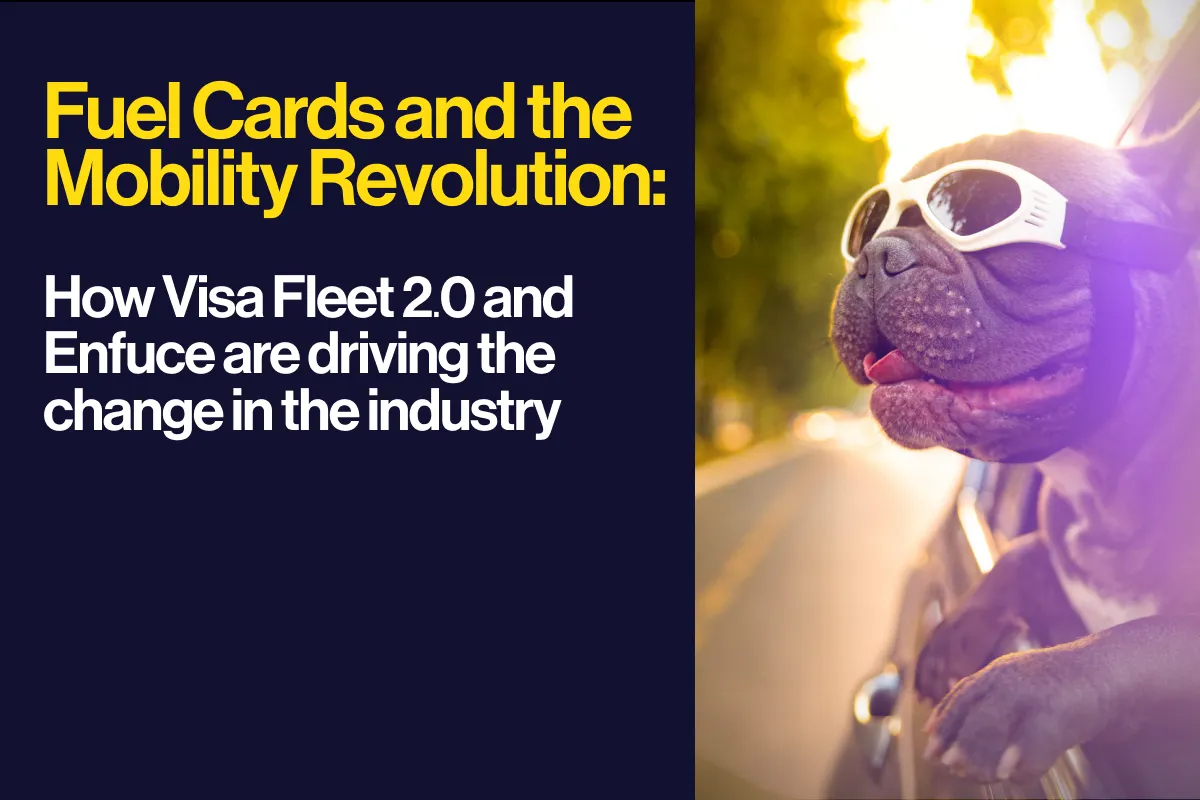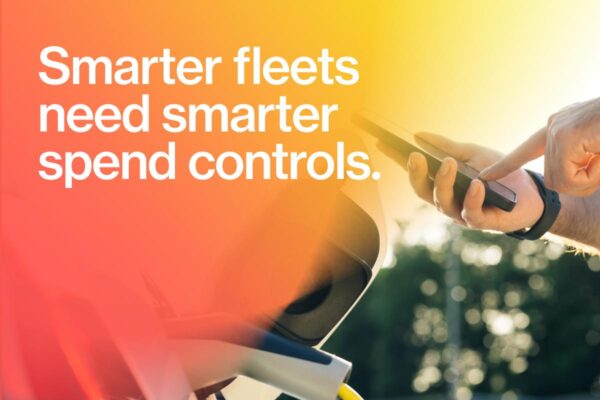Fuel Cards and the Mobility Revolution – How Visa Fleet 2.0 and Enfuce are driving change in the industry

In today’s ever-changing world, we’re witnessing a revolution in the way we move around, with electric vehicles, ride-sharing services, and sustainable mobility options taking center stage. And guess what? Payment solutions are evolving too, keeping up with the changing times.
Fuel cards, once limited to fuel purchases, have become versatile tools in the fleet industry. They’re not just for filling up your tank anymore! These cards are now being used for a whole range of transportation expenses, from charging your electric vehicle to hopping on public transit, and even renting bikes and scooters, becoming key in improving the experience of business travel.
In our recent webinar, Richard Campion, Head of Fleet and Business Mobility at Visa, and our very own Markus Kalela, Senior Customer Success Manager, shed light on what the future of mobility holds and what the role that fuel cards will play in shaping what’s next for this industry. Read on to learn some key takeaways from the webinar.
Flexibility is essential – be it in travel or how we pay.
Most of us have experienced both travelling for work and leisure. As we look ahead, the seamless experience we enjoy as leisure travellers should become the benchmark for our business journeys – especially when it comes to how we pay.
“I think what I’m increasingly looking for, as I guess a business traveller, is to be able to use those exact same solutions that I have on the consumer side when I’m travelling for business as well”, Richard Campion stated, adding that this should also apply to all types of expenses for any unforeseen circumstance. “To have that flexibility, I think, is key”, he stressed.
According to Visa’s research the average driver is carrying 2.3 cards with them, not only due to network access but also due to fuel cards’ spending limits – all of this contributes to making the entire business travel experience more cumbersome and potentially more expensive for all parties involved.
Now more than ever, there is a need for solutions that are smooth and flexible, allowing drivers and business travellers to easily handle all aspects of their journey, whether it’s filling up with fuel at the closest station, covering unexpected expenses on the go, or switching from one means of transportation to another.
“So many fleets today are mixed fuel, and again, catering for those needs is vital,” Markus commented, highlighting that with increased focus on sustainability, we need to be able to use our fuel cards not only for fuel expenses but also to charge our hybrid or electric vehicle, travel on the transit network, use micro-mobility or ride-sharing.
And this is where Visa Fleet 2.0 comes in. Visa’s newest fleet and mobility card solution, which Enfuce helps deliver in Europe, makes sure customers receive that seamless experience where multiple needs are met.
Indeed, unlike most traditional closed-loop cards, ‘Visa Fleet 2.0’, is not restricted to specific fuel retailers or specific types of products like petrol or diesel, and can be used at any location accepting Visa cards. But there’s more. Enfuce and Visa are also working towards enabling payment cards to be used for a wide range of mobility and business expenses, giving customers the flexibility to choose the transportation options that best suit their needs. At the same time, Visa Fleet 2.0 also offers a wide range of spend controls which can be tailored according to the needs of the fleet.
No doubt – the future will be greener.
Transportation is indeed moving towards greener solutions, with 73% of fleet managers planning to transition to electric, hybrid, or hydrogen cell vehicles within the next five years, 59% planning to reduce their car budget and move to a mobility budget solution and only 24% expecting their next company car to be diesel or petrol.
But there are some challenges that we need to overcome to make the transition towards sustainability happen faster.
One of the biggest challenges in the transition to electric vehicles is the fragmented nature of the charging infrastructure. While the number of charging stations is increasing, there is still a need for a widespread and accessible charging network.
At the same time, the charging experience needs to be streamlined and user-friendly, with integrated payment solutions that make it easy for EV owners to charge their vehicles. “If you have ever driven an electric vehicle, I’m sure you know how many apps and tags are involved in getting your vehicle charged in the various charging points,” Markus stressed, adding that while there’s a relatively stable fuel retail network in the EV space, there are still lots of operators with their own systems and setups.
On top of this, payments do remain an obstacle to EV adoption:
“I think all of us within the payments industry, we need to make sure that we’re doing our bit to try and take the pain away from that aspect”, Richard commented.
With 71% of customers wanting digital wallet solutions and 64% virtual or all in one cards when it comes to EV charging, Visa Fleet 2.0 aims to deliver that single payment card that can be used across various charging networks, simplifying the process and making it easier for EV drivers to access the charging infrastructure.
New opportunities for issuers.
And with all these changes taking place, how can fleet card issuers remain relevant? There are great opportunities for issuers to transition to more flexible mobility cards, beyond fuel-related payments, and leverage the open-loop system, which is key in granting the flexibility that customers are looking for, also when it comes to mobile and contactless payments.
Open-loop systems such as Visa Fleet 2.0, which enable customers to use the same card or mobile wallet they use for everyday purchases, allow for better expense management and product-level controls as well as transaction data management. At the same time, with sustainability in the spotlight, opportunities such as entering the electric vehicle charging business will become more important than ever.
“Many players are really focusing on expense management as a capability, but more and more of the traditional fuel card issuers and maybe other financial institutions are eyeing in the direction of bringing more visibility and control regarding their expenses,” Markus commented.
At the end, issuers will be looking at solutions that can strengthen their business by opening new revenue streams and attracting new customers.
The fuel card of the future.
In conclusion, the future of mobility is more flexible and sustainable than ever before, with fuel cards playing a pivotal role in enabling seamless and convenient payment experiences, unlocking new opportunities for issuers. Fuel cards will no longer be just about purchasing fuel. They are already evolving to meet the changing demands of business travellers and drivers from more comprehensive mobility budgets to smoother expense management.
With the advancements in technology and the introduction of Visa Fleet 2.0, fuel card solutions are poised to provide even greater value and convenience to both businesses and individuals. As we look ahead, it is clear that the future of mobility payments is bright, and fuel cards will continue to be at the forefront of this transformation, driving innovation and enhancing the overall mobility experience for all.
Case studies, comparisons, statistics, research and recommendations are provided “AS IS” and intended for informational purposes only and should not be relied upon for operational, marketing, legal, technical, tax, financial or other advice. Visa Inc. neither makes any warranty or representation as to the completeness or accuracy of the information within this document, nor assumes any liability or responsibility that may result from reliance on such information. The Information contained herein is not intended as investment or legal advice, and readers are encouraged to seek the advice of a competent professional where such advice is required.



